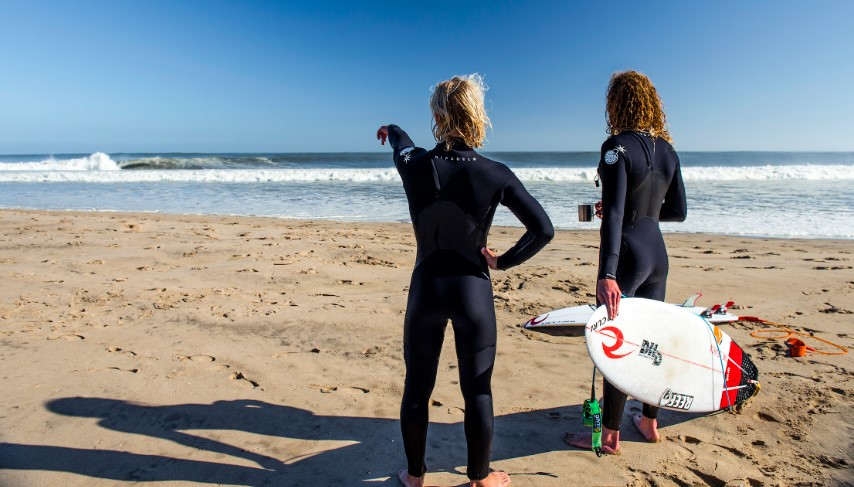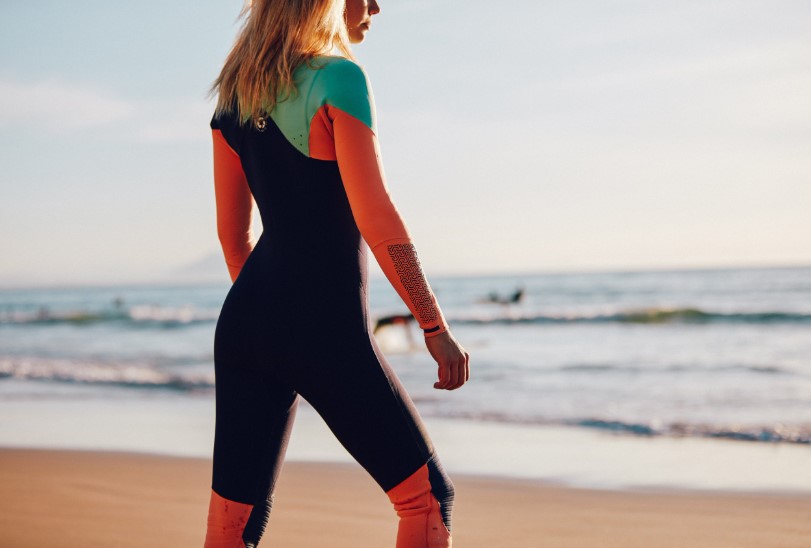We all know the feeling – you’re at the beach, the sun is shining, and the waves are calling your name. But before you head out into the water, there’s one more decision to make: should you wear a wetsuit?
Wearing a wetsuit when surfing has become the norm for many surfers worldwide. But is it really necessary?
There’s a lot of debate over whether you should wear a wetsuit when surfing. Some people swear by them, while others think they waste time and money. So which is it – should you always wear a wetsuit when surfing?
Well, the answer to that question isn’t relatively as straightforward as you might think. It depends on several factors. We’ll take a closer look at both sides of the argument and help you decide for yourself whether or not wearing it is right for you. Click here to learn more about different types of wetsuits and their respective benefits.
Why Wear A Wetsuit When Surfing?

There is some debate about this topic, but the consensus is that you should wear a wetsuit if you are surfing in cold water. If you are surfing in warm water, wearing it may not be necessary.
There are several reasons why wearing a wetsuit can help protect you while surfing. Wearing a wet suit will help keep your body temperature higher than usual, reducing the risk of hypothermia. It also helps to prevent water from entering your lungs, which can cause drowning or severe respiratory problems.
Finally, a wet suit can make staying on top of the waves easier, especially if you’re new to surfing, because it provides more stability and protection against falls.
So whether or not you need to wear it when surfing depends on the weather conditions and your experience level. But no matter what, remember to stay safe and enjoy yourself.
What Are The Major Reasons And Factors Behind Wearing A Wetsuit When Surfing?

When surfing, it is essential to be aware of the risks that come with the activity. Wearing a wetsuit can help reduce these risks significantly, and in some cases, it may even be mandatory. Here are several reasons and factors to consider when deciding whether or not to wear a wetsuit when surfing:
- It protects surfers from cold water temperatures by trapping body heat. They are made of insulating materials that trap body heat and prevent heat loss. This is especially important in colder climates where the water temperature can be freezing. This means you will stay warmer longer in more frigid waters, reducing the risk of frostbite or hypothermia.
- It also helps protect against cuts and abrasions while surfing. The neoprene material is tough enough to resist damage but flexible enough to conform to your body contours so that you don’t get stuck on objects or rocks underwater.
- It keeps you dry, which prevents sand from getting into your eyes and mouth and causing irritation or infection. In addition, they help avoid windburn by shielding your skin from the harmful UV rays and gusts of wind that can cause extreme pain and blistering.
- It also provides buoyancy, which helps surfers float and paddle more easily. The extra buoyancy can be helpful in waves that are difficult to catch or in significant swell conditions. Finally, a wetsuit can help surfers be safe from dangerous marine life, such as sharks and jellyfish.
What Are The Drawbacks of Wearing A Wetsuit?

There are a few potential drawbacks to wearing a wetsuit, the most common of which is that it can make you too hot. Wearing a wetsuit also restricts your movement, making it difficult to swim or dive effectively.
Additionally, a wetsuit can be cumbersome and restrictive, making it challenging to move around and wear for long periods. Finally, they can be expensive and difficult to repair if they get damaged.
To Wetsuit Or Not To Wetsuit?
There’s a lot of debate surrounding whether or not wearing a wetsuit while surfing is necessary. Some people swear by them, citing that they provide better protection from the water than regular clothes. Others argue that a wetsuit makes it harder to catch waves and can be incredibly uncomfortable to wear for long periods.
If you’re surfing in warm water with no chance of encountering dangerous wildlife, you can probably get by without a wetsuit. However, wearing it is advisable if you’re surfing in cold water or in an area with sharks or other predators.
Ultimately, the decision comes down to personal preference. If you’re comfortable wearing one and feel it provides optimal protection against the water, go for it. But if you’re worried about how it’ll feel and whether or not you’ll be able to surf effectively in one, there’s no harm in trying out both options and seeing which suits your needs better.

Conclusion
If you’re a surfer, you know that there are a lot of different factors to consider when hitting the waves. One of the most important decisions is whether or not to wear a wetsuit. Both options have pros and cons, so weighing your options carefully before deciding what’s best for you is crucial.
Wearing a wetsuit can help keep you warm in colder waters, which is a significant plus. It can also provide some extra buoyancy, which can be helpful if you’re new to surfing or still getting the hang of things. On the downside, a wetsuit can be constricting and uncomfortable in hot weather, making it more challenging to move around in the water.
So, should you always wear a wetsuit when surfing? Ultimately, it’s up to you. Consider your personal preferences and the conditions of the day before making your decision. And don’t forget – no matter what you choose to wear (or not wear), always surf safely.
The bottom line is that you need to be comfortable in the water and feel confident that you’re making the right decision for your own safety. So, before you suit up, be sure to take all of these things into consideration.
